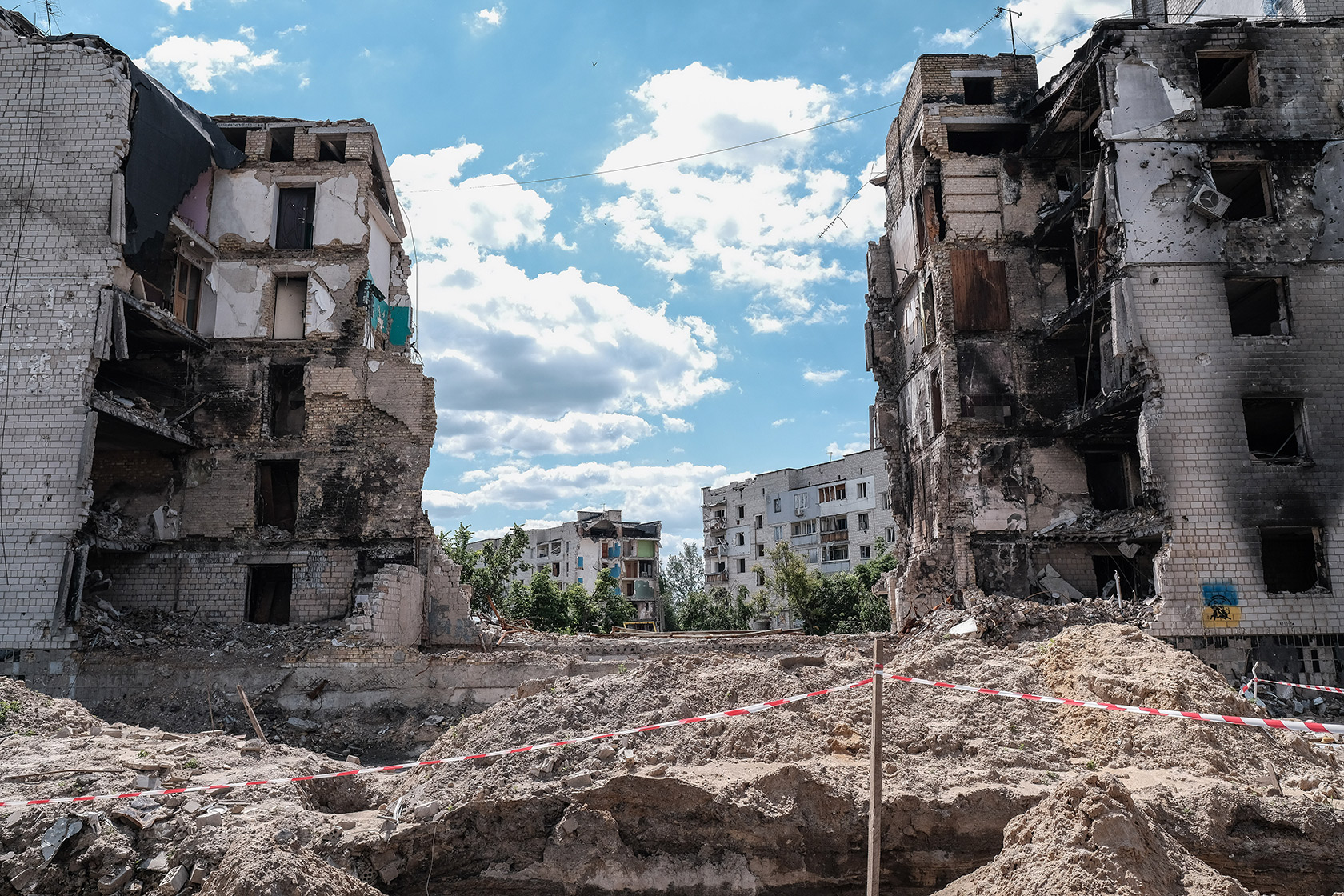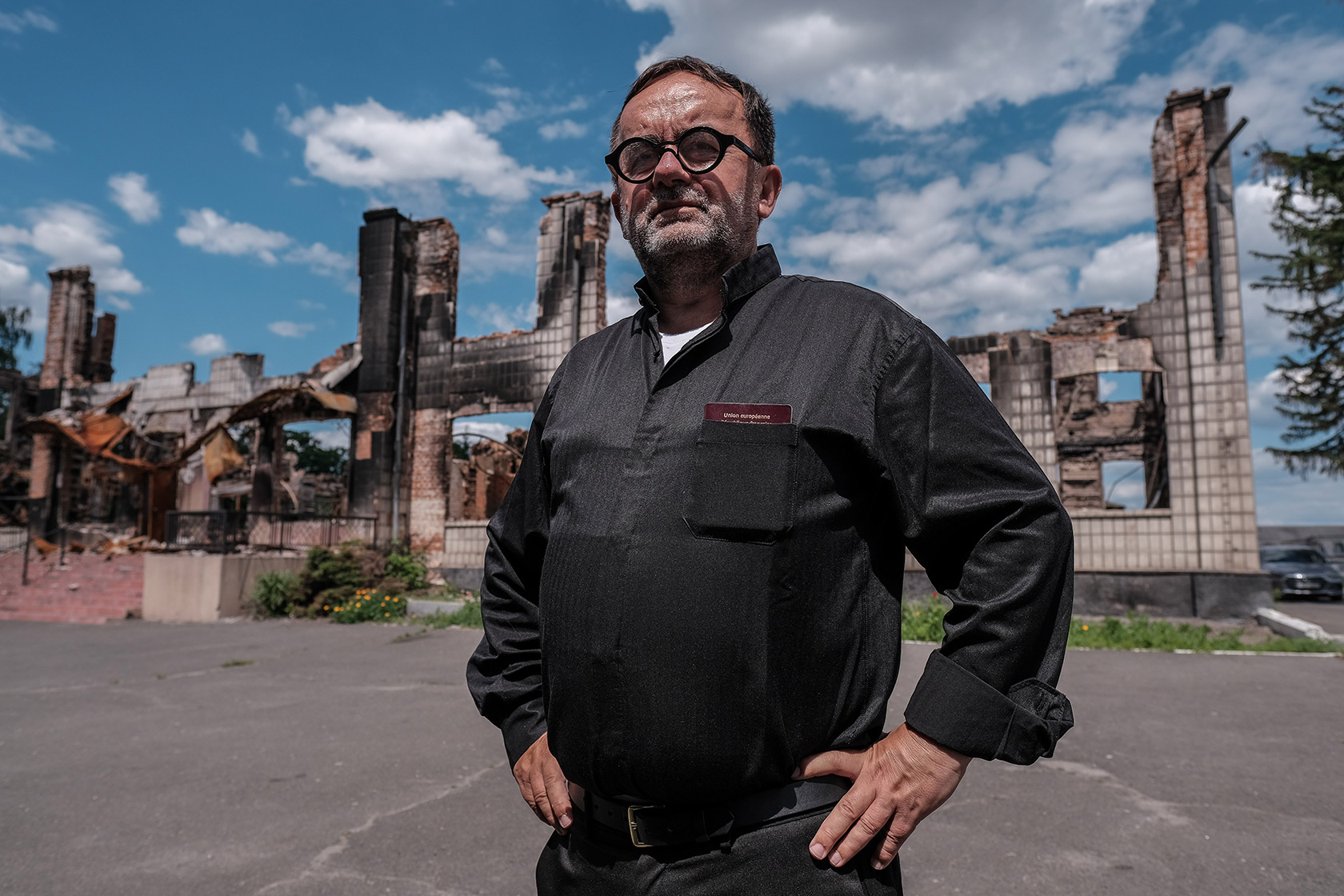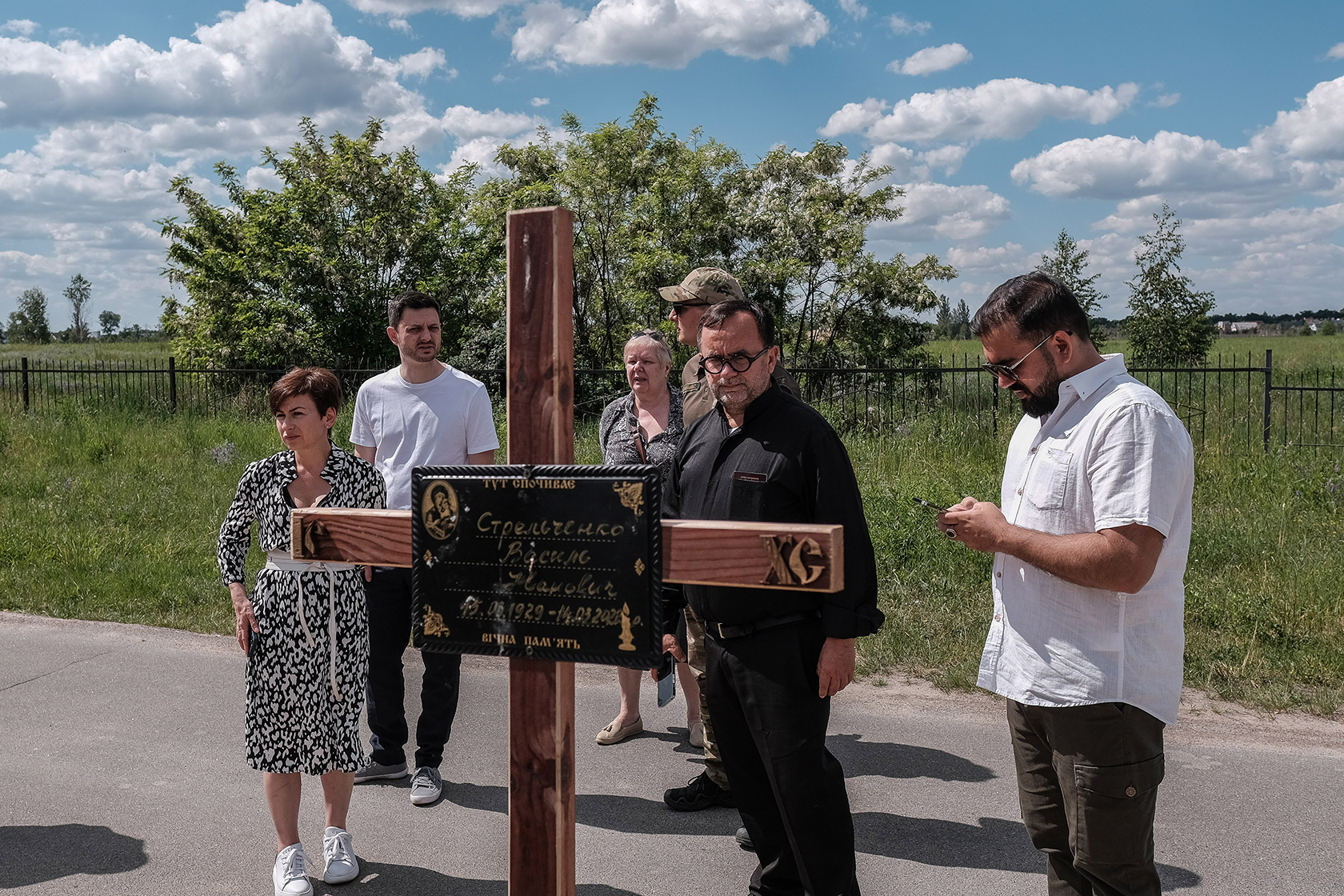Russia will continue to pose an existential threat even after Putin's death – Father Patrick Desbois

In April, the cities and towns lying just outside of Kyiv became the sites of pilgrimage for top European politicians.
There, they lent their ear to those cities’ mayors and local volunteers and their stories of the war crimes committed during the Russian occupation in March 2022; they raised their heads, training their eyes on the infamous ceramic rooster atop a kitchen cabinet that was somehow spared under Russian bombardment; they inspected the destroyed apartment buildings and witnessed the exhumations of mass graves.
"Here there were two trenches, one parallel to the other: 116 people were buried here, including 30 women and two children aged four and 10, and the rest were men, including three Ukrainian soldiers and one occupier. According to the National Police, 461 civilians were killed in Bucha."
"We are at the site of the first attack on civilians in Borodianka. The attack totally destroyed two high-rise apartment buildings, burying 41 people under the rubble."
"This high-rise in Irpin was hit by the first missile. Over 1,500 private houses in Irpin were completely destroyed, another 1,500 were partially destroyed; over 500 high-rise apartment buildings have been completely or partially destroyed. Around 300 civilians were killed as well as 37 guys from the Territorial Defence. Over 7,000 families were deprived of their homes."
[BANNER1]These facts are presented dispassionately during the "tours" of the three circles of hell named Irpin, Bucha, and Borodianka. The sites of wreckage and destruction speak for themselves.
These visits offer foreign politicians a way of paying their respects, as well as some sort of inoculation. Of course, there is no certainty, but at least they offer the politicians an opportunity to save their souls from being corroded by indifference.
"What we had the greatest difficulty fighting all these years is indifference. Human indifference to mass crimes. But I am certain that we have to tell these stories. Today’s terrorists are no different from those who killed people in Babyn Yar."
These were the words with which Father Patrick Desbois, a French Roman Catholic priest, concluded his interview for Ukrainska Pravda in April 2021.
Father Desbois has spent the last 20 years travelling Ukraine in search of mass graves where people executed during World War II were buried. He made 69 visits to Ukraine, conducted almost 3,000 interviews with witnesses of these mass executions, and found over 1,200 mass graves where Jews, Roma, prisoners of war, and partisans were buried.

He spent all these years ensuring the dead have their graves and the living have their memories. All along, he emphasised: "I am not interested in memory as such, I am interested in the circumstances of these crimes. Interviews I conduct with witnesses of these crimes are not about commemoration, but about concrete issues: how many people there were, where was the equipment, were the spades hidden after the pit had been dug."
Patrick Desbois together with Yahad – In Unum [Together - ed.], an organisation he created, began documenting crimes committed by the Islamic State, a militant Islamist group, interviewing several hundred Yazidi survivors.
On the eve of 24 February 2022, Patrick Desbois was in Jerusalem on account of his position as the head of the academic council of the Babyn Yar Holocaust Memorial Centre.
"Will you return to visit our mass graves in Ukraine?" a Ukrainian colleague asked him on 23 February before boarding the last flight from Israel to Kyiv on the eve of Russia’s invasion.
In March, Desbois announced that he and his team, in cooperation with the Babyn Yar centre, were beginning to gather evidence of the war crimes Russia has committed against Ukraine’s civilian population. His goal was to submit this evidence to the International Criminal Court and the prosecutors’ offices in European countries that have launched investigations [into Russian war crimes - ed.] in order to hold Russia accountable for the crimes it committed.
Over several months of work, Desbois and his team recorded interviews with over 100 witnesses and victims of Russian war crimes in Mariupol, Irpin, Kharkiv, Kherson, and other Ukrainian cities.
[BANNER2]A year ago, in the then-peaceful Kyiv, we were asking Father Desbois whether he believes that the Holocaust has transformed humanity and whether a "vaccine" against genocide was possible. In June 2022, we returned to our conversation, now with the hindsight of what he saw and heard in Irpin, Bucha, and Borodianka.
What follows is Father Desbois’s direct account.

On deportation and torture
Today, mass deportations constitute a Russian crime that is almost invisible to the eyes of the rest of the world. We don’t know enough about what happens to Ukrainians who have been deported. The Russians kidnap people, interrogate them, destroy them with torture and threaten to kill their children.
We have testimony from a woman who was deported from Mariupol to Russia together with her husband. They were hiding in a factory and when the Russians captured the factory they wanted to evacuate to Ukrainian territory. But the bus they boarded took them to Russia instead.
When we were collecting her testimony, she talked for eight hours straight. She remembers every single person who interrogated her. We couldn’t even ask her any questions – she just talked and talked for eight hours without any questions or prompts.
Women were interrogated separately from the men; they were forced to undress, and Russian women wearing rubber gloves examined their bodies – they looked everywhere where they could have even the smallest tattoo.
She was able to escape Russia, which is why we could collect her testimony. Her husband, however, has gone missing. She doesn’t know whether he is alive.
On the instinct to kill
That Russian man who was convicted of murder was very young. An ordinary young Russian man.
People have an instinct to kill, it’s an innate knowledge, just as dogs innately know how to swim. There’s no need to learn how to kill – it’s part of human nature.
Human history is built on crimes. Every country in the world is built on large-scale crimes. Even the Bible opens with brother murdering brother. And in the biblical tale, the murderer survives.

On "denazification" and Russian attack on Babyn Yar
The Soviet army destroyed Hitler and his army but failed to liberate its own country as well as other Eastern European countries from another dictator, Joseph Stalin. The Soviet army’s goal was to conquer and colonise those Eastern European countries, just as in the days of colonial conquests.
They have taken advantage of the history of Holocaust. The Soviet archives don’t mention Jews. They only speak about innocent victims among the civilian population. Russian memorials still say this. Babyn Yar for Russians is not a Holocaust site but a site where innocent Soviet people were killed.
The question is not why they [the Russian troops - ed.] bombarded Babyn Yar – they don’t care about Babyn Yar.
[BANNER3]For me, the main question is why Russians are still susceptible to the propaganda that peddles murder.
In the interviews we are currently recording with witnesses of Russian war crimes, people say that each Ukrainian citizen who ends up in a filtration camp is undressed and examined; the Russians are searching for Nazi tattoos on their skin. The Russians believe that all Ukrainians are Nazis.

On hatred towards Russians
It is impossible to avoid hatred. They [the Russians - ed.] came to Ukraine, they are killing children, raping women, looting, destroying everything in their way – how is it possible not to hate them?
This feeling gives strength to continue fighting. As soon as Ukrainians stop fighting Russians, they will become Russians.
Hatred must teach you [i.e., the Ukrainian people - ed.] to be careful. You have to understand that even when Putin dies, Russia will continue to pose a mortal threat. To have a neighbour like this is your greatest misfortune.
On ISIS and Russia
The Islamic State (ISIS) militants believed that after death they will immediately find themselves in paradise because they believed that they were recovering Muhammad’s legacy. And they killed anyone who did not agree with them.
Russians in Ukraine dream not of paradise but of irons and television sets.
In contrast to Ukraine, large Iraqi cities, such as Mosul, fell in just a few days. The Islamic State rapidly conquered huge territories without any resistance.
The difference [between Iraq and Ukraine - ed.] is that ISIS was fighting not against the Iraqi army but against a coalition of many countries. Iraq and Syria weren’t alone - nearly 40 countries joined a coalition with them. Does Ukraine have access to American, British, and French planes? No, it doesn’t.
Meanwhile, arrests, torture, rape, and murders – they are just the same in Ukraine. In terms of war crimes, everything is the same. And the ISIS propaganda was as powerful and destructive as the Russian propaganda.
ISIS militants raped many women in Iraq. And those women spoke out about it. Nadia Murad was a sex slave; she was raped by ISIS militants – and then she wrote a book and was awarded the Nobel Peace Prize. In Ukraine, the customs are different. I worry that Ukrainian women will not want to talk about it. And this is an issue.

On war symbols
In March and April, war crimes committed against civilians were on the front pages of news all over the world. The whole world saw photographs from Bucha, but no one knew how many civilians were killed. Today I heard that number for the first time.
This is a common story everywhere where there is war. Journalists focus their attention on one place, somewhere where a terrible tragedy has occurred, and this place becomes the symbol of the war.
And even if a hundred times more people are killed in some other place later on, it somehow fails to capture people’s attention. It’s the same everywhere. It’s what happened in Iraq. It’s what happened in China. In the 1930-40s, the Japanese killed 20 million Chinese citizens, but everyone only remembers one massacre site – Nanjing. This doesn’t contribute to justice.
On black-and-white and shades of grey
The world didn’t suddenly turn black and white on 24 February. There are many shades of grey. We hear from people who spent time under Russian occupation. They say that some Russians gave them food and were nice to them. There are many people who are cooperating with the Russians; many people will work with Russian occupation authorities.
This is a grey area, and a large one at that. Very often, it’s the grey areas that determine the course of history. Putin knows people well; he understands this well and is counting on it. He is counting on the world getting tired of the war in Ukraine.
However, today the world doesn’t seem tired of Ukraine. Everyone has mobilised, and Ukrainian flags are flying everywhere. The West hasn’t been as mobilised as it is now since the war in Vietnam. But we will lose this momentum if we don’t keep reminding the world about the civilian victims of this war.
On perceptions of the war in the West
Early on in the war, everyone was talking about the raped women and girls, the corpses with their hands tied behind their backs found on the streets. Now, by contrast, journalists and reporters are heading for eastern Ukraine, closer to the frontline, and are covering the specifics of how the two armies are fighting. Their commentary sounds like it’s an imaginary battle for Stalingrad, as if there are no civilians – only the two armies trying to destroy one another.
The West is beginning to perceive this war as the battle of two armies.

On punishing the criminals
In reality, those who perpetrated war crimes during World War II were hardly ever punished.
Germans who fired on civilians during World War II said that they were following orders and are therefore not guilty.
In the Soviet Union, local collaborators who aided the Germans were demonstratively punished. But they were punished not for the murder of civilians, but for treason, for betraying their Soviet motherland.
Just as happened in Germany, many Russians will flee back to Russia and hide there – and will never be punished for their crimes.
I don’t believe that Putin can be convicted. Who will be able to capture Putin in Russia? No one. Even if he is convicted in absentia, this will not affect his life in the slightest.
In my opinion, the strategy has to be to try those Russians who are committing crimes in Ukraine and make these trials as public as possible. To make the world see the criminals and their crimes.
If you want peace, you have to use the same tools as those used by people who want war: propaganda and money. Only these tools will overcome them.
Mykhailo Kryhel, Ukrainska Pravda
